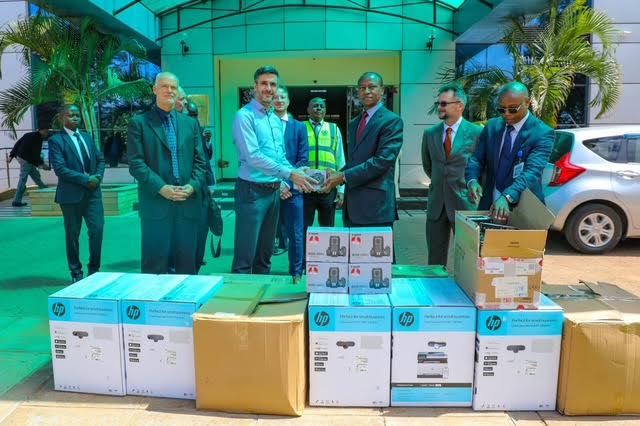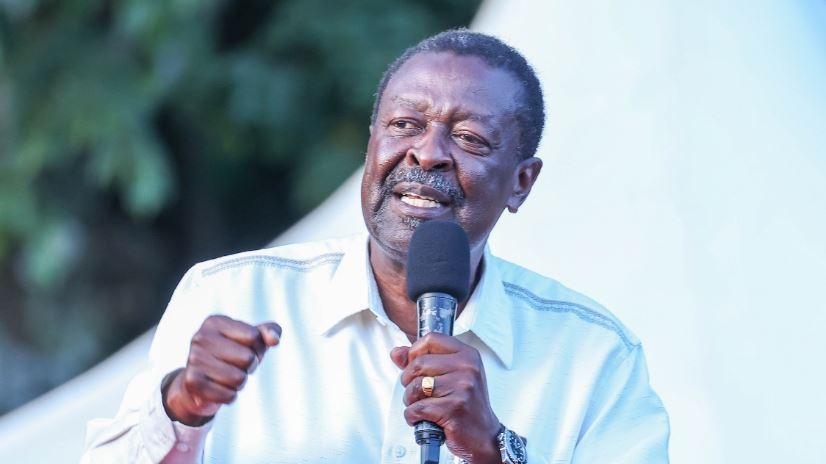 German Federal Criminal Police Office representative El-Mokdad Zafer (L) hands part of the equipment to DCI's Abdalllah Komesha during the event
German Federal Criminal Police Office representative El-Mokdad Zafer (L) hands part of the equipment to DCI's Abdalllah Komesha during the event
The Directorate of Criminal Investigations made significant progress in the fight against cybercrime after partners from Germany, through AFRIPOL, donated a range of modern digital forensics equipment to the DCI National Forensic Laboratory.
The new tools will change how investigators handle digital and cyber-related crimes, improving the DCI’s ability to keep up with more advanced criminal networks, officials said.
The Director of the Investigations Bureau, Abdallah Komesha, received the equipment on behalf of the Director of DCI.
Komesha said the donation came at an optimal time and emphasized that it will significantly increase the speed, accuracy, and efficiency of digital investigations.
“This will help ensure that important cases are resolved more quickly, allowing justice to be served without unnecessary delays,” he said Tuesday.
The donation is part of the German Government-funded Digital Forensics Project, which involves collaboration between DCI Kenya, AFRIPOL, and the German Federal Police.
The initiative aims to develop selected cyber and digital forensic laboratories into centers of excellence for investigating cybercrime in their regions.
As part of this programme, the DCI’s Cyber and Digital Forensics Laboratory was chosen as the main center for the Eastern Africa Region.
Also at the handover ceremony was Gillon Mwangi, the Deputy Director of Forensics, who reaffirmed the Forensic Directorate’s commitment to making good use of the equipment to fight cybercrime.
The event was graced by a delegation from the Embassy of Germany, the German Federal Police, and the Federal Criminal Police Office, led by El-Mokdad Zafer.
Meanwhile, the Kenya National Workshop on System Analysis of Criminal Networks engaged in the trafficking of Weapons of Mass Destruction (WMDs), dual-use goods, and nuclear materials in East Africa met at the Safari Park Hotel.
Presided over by the Director of Training at the DCI, Adan Guyo, on behalf of the Director of DCI, the milestone event—facilitated by the United Nations Office on Drugs and Crime (UNODC) and the US Export Control and Related Border Security Assistance Programme—brought together experts, policymakers, and law enforcement agencies to enhance regional collaboration, intelligence sharing, and innovative strategies against transnational threats.
Participants were taken through cutting-edge tools to strengthen collaboration between national and regional stakeholders, build capacity to detect, prevent, and disrupt illicit trafficking routes, enhance intelligence-led approaches to dismantle criminal networks, and reinforce Kenya’s leadership in safeguarding East Africa against emerging global security challenges.
Guyo pointed out that illicit trafficking of WMD-related materials, dual-use goods, and nuclear and radioactive substances is not a distant or hypothetical threat but a clear and present danger to the region and the world, adding that criminal networks exploit weaknesses in regulatory frameworks, porous borders, and gaps in inter-agency coordination to move these deadly materials with alarming impunity















![[PHOTOS] Family, friends receive body of Raila’s sister, Beryl](/_next/image?url=https%3A%2F%2Fcdn.radioafrica.digital%2Fimage%2F2025%2F11%2Fdfe6a9bf-ede1-47a4-bdc0-4f564edb03dd.jpeg&w=3840&q=100)
